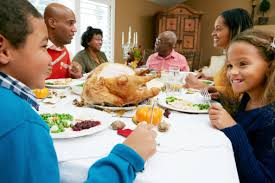As families and friends gather for Thanksgiving Day this year, there will likely be oft-repeated tales about favorite recipes or the family stories that always make everyone laugh. In the midst of these gatherings is an excellent opportunity to learn more about what makes your family unique – in every sense of the word.
In 2004, the Surgeon General, through the Department of Health & Human Services, designated Thanksgiving as National Family History Day. This is an opportunity for all families to learn more about the common and rare diseases that can run through several generations.
As you all reminisce about holidays gone by, it’s a good time to begin documenting the various health conditions family members have. If you have high blood pressure and other relatives do too, it’s a great opportunity to educate the younger family members about the disease in an open, honest, and informed manner. The teens in the family don’t need to be terrified about the potential for heart disease or diabetes, but they should be armed with information about how they can help keep themselves healthy.
National Family History Day gives families a chance to uncover common threads they might not have realized. While the Surgeon General’s office found that most Americans believe in the important of knowing a family history, only about one-third have ever tried to document their own family’s health history.
What should you ask about? Really anything that might help you. Once you know the common threads, you can all learn about how to stay healthy or manage those specific conditions. For instance, are there relatives with breast and ovarian cancer (especially early onset) from generations ago? What about testicular cancer? When everyone is together, you can act as an educated group to make sure family members are getting appropriate testing or monitoring.
Because the Surgeon General considers family history as such an important health indicator and screening approach, the office has created the My Family Health Portrait online monitoring tool to help families document conditions and diseases. This tool means the documented history can be shared among family members and updated as health changes occur. Family members can even bring a copy of the document to healthcare visits to help inform their health team about important information.
Nurses don’t need anyone to tell them what kind of a predictor family history is. Each day, they see families with shared conditions. But if they don’t discuss their own detailed family health histories and if they don’t always ask the right questions, they could be missing some important health information of their own. Many families don’t talk about things like reproductive health problems or of mental health issues. Some might not discuss alcoholism or addiction. But each of these health conditions provides an essential piece of a family’s health picture.
Before you begin this process, the Surgeon General’s office has prepared some tips to help you. You’ll want to be ready to get the information, but realize you might not get everything on the first try. Make sure you are clear about what you are doing and why. Some people don’t like to talk about their health issues, but if they realize it could help save a loved one, they might look at your information gathering in a very different light.
Consider this an ongoing conversation among family members, and that Thanksgiving is just a start. Realize not everyone will be on board. Get as much information as you can without upsetting anyone. Be encouraged by what you can find out – you are helping your family now and for generations to come.
- WOC Nurses Week Highlights Specialty - April 16, 2024
- Honoring Radiology Nurses Day on April 12 - April 12, 2024
- Travel Offers New Career Possibilities - April 8, 2024



